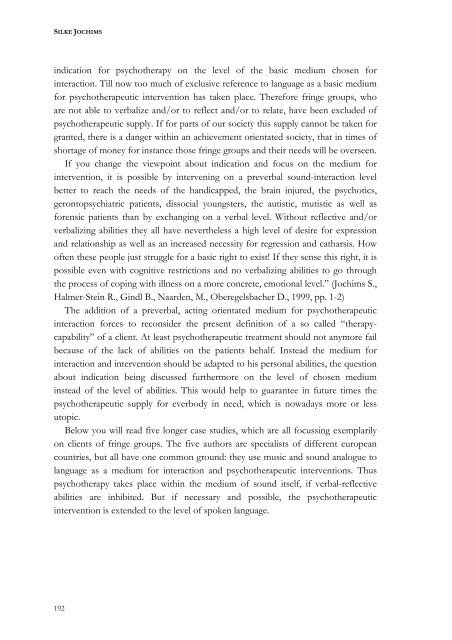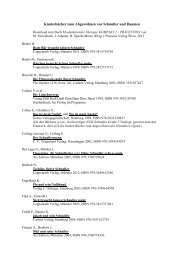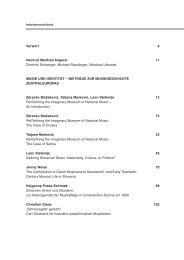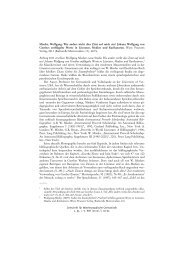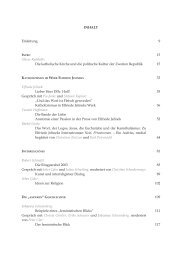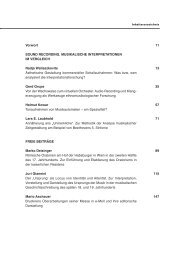- Seite 1 und 2:
WIENER BEITRÄGE ZUR MUSIKTHERAPIE
- Seite 3 und 4:
INHALT ZUR THEORIE DE BACKER, JOS /
- Seite 5:
Vorwort Wir haben uns gefragt, ob e
- Seite 9 und 10:
JOS DE BACKER / JAN VAN CAMP SPEZIF
- Seite 11 und 12:
Spezifische Aspekte in der musikthe
- Seite 13 und 14:
Spezifische Aspekte in der musikthe
- Seite 15 und 16:
Spezifische Aspekte in der musikthe
- Seite 17 und 18:
Spezifische Aspekte in der musikthe
- Seite 19 und 20:
Spezifische Aspekte in der musikthe
- Seite 21 und 22:
Spezifische Aspekte in der musikthe
- Seite 23 und 24:
Spezifische Aspekte in der musikthe
- Seite 25 und 26:
DOROTHEA OBEREGELSBACHER / DOROTHEE
- Seite 27 und 28:
Primärprozess und Sekundärprozess
- Seite 29 und 30:
Primärprozess und Sekundärprozess
- Seite 31 und 32:
Primärprozess und Sekundärprozess
- Seite 33 und 34:
Primärprozess und Sekundärprozess
- Seite 35 und 36:
Primärprozess und Sekundärprozess
- Seite 37 und 38:
Primärprozess und Sekundärprozess
- Seite 39 und 40:
Primärprozess und Sekundärprozess
- Seite 41 und 42:
Primärprozess und Sekundärprozess
- Seite 43 und 44:
BARBARA GINDL »ANKLANG« FINDEN -
- Seite 45 und 46:
Anklang finden - emotionale Resonan
- Seite 47 und 48:
Anklang finden - emotionale Resonan
- Seite 49 und 50:
Anklang finden - emotionale Resonan
- Seite 51 und 52:
Anklang finden - emotionale Resonan
- Seite 53 und 54:
Anklang finden - emotionale Resonan
- Seite 55 und 56:
ISABELLE FROHNE-HAGEMANN ZUR ARBEIT
- Seite 57 und 58:
Zur Arbeit mit Traum und Imaginatio
- Seite 59 und 60:
Zur Arbeit mit Traum und Imaginatio
- Seite 61 und 62:
Zur Arbeit mit Traum und Imaginatio
- Seite 63 und 64:
Zur Arbeit mit Traum und Imaginatio
- Seite 65 und 66:
Zur Arbeit mit Traum und Imaginatio
- Seite 67 und 68:
Zur Arbeit mit Traum und Imaginatio
- Seite 69 und 70:
Zur Arbeit mit Traum und Imaginatio
- Seite 71 und 72:
Zur Arbeit mit Traum und Imaginatio
- Seite 73 und 74:
Zur Arbeit mit Traum und Imaginatio
- Seite 75 und 76:
Zur Arbeit mit Traum und Imaginatio
- Seite 77 und 78:
HILDEMARIE STREICH MUSIK IM TRAUM M
- Seite 79 und 80:
Musik im Traum schiedlicher Herkunf
- Seite 81 und 82:
Musik im Traum und pflegt häufig v
- Seite 83 und 84:
Musik im Traum „har“ in dem Wor
- Seite 85 und 86:
Musik im Traum In seinem Gespräch
- Seite 87 und 88:
Musik im Traum Analog zum Welten-Mo
- Seite 89 und 90:
Musik im Traum zugleich. Sie fasst
- Seite 91 und 92:
Musik im Traum Tier. Und ich tue, w
- Seite 93 und 94:
Musik im Traum samung und Kontaktve
- Seite 95 und 96:
Musik im Traum sie in der Nazi-Zeit
- Seite 97 und 98:
Musik im Traum mit dem Gedanken: Wi
- Seite 99 und 100:
Musik im Traum mittlerin einer das
- Seite 101 und 102:
Musik im Traum scheint einem tiefen
- Seite 103 und 104:
LILIT SIMONIAN ZUR ARCHETYPISCHEN E
- Seite 105 und 106:
Zur archetypischen Ebene der Musikw
- Seite 107 und 108:
Zur archetypischen Ebene der Musikw
- Seite 109 und 110:
Zur archetypischen Ebene der Musikw
- Seite 111 und 112:
Zur archetypischen Ebene der Musikw
- Seite 113 und 114:
Zur archetypischen Ebene der Musikw
- Seite 115 und 116:
Zur archetypischen Ebene der Musikw
- Seite 117 und 118:
GABRIELE ENGERT-TIMMERMANN / TONIUS
- Seite 119 und 120:
Körper - Atem - Musik Andererseits
- Seite 121 und 122:
Körper - Atem - Musik sich diese e
- Seite 123 und 124:
Körper - Atem - Musik dadurch zu s
- Seite 125 und 126:
Körper - Atem - Musik gleichmäßi
- Seite 127 und 128:
Körper - Atem - Musik Der bisher b
- Seite 129 und 130:
Körper - Atem - Musik Strobel, W.
- Seite 131 und 132:
Atem und Stimme New Age Bewegung Im
- Seite 133 und 134:
Atem und Stimme Pythagoras, Hans Ka
- Seite 135 und 136:
Atem und Stimme außereuropäischen
- Seite 137 und 138:
Atem und Stimme Veränderungen der
- Seite 139 und 140:
Atem und Stimme Beispiel einer konk
- Seite 141 und 142:
Atem und Stimme • Dominik kommuni
- Seite 143 und 144:
ELENA FITZTHUM IN ILLO TEMPORE VOM
- Seite 145 und 146:
In illo tempore Sequenzen besteht,
- Seite 147 und 148: In illo tempore Einfluß des Positi
- Seite 149 und 150: In illo tempore gleichsam die Enth
- Seite 151 und 152: In illo tempore Am Beispiel der Psy
- Seite 153 und 154: In illo tempore 2. Stunde: Frau G.
- Seite 155 und 156: In illo tempore Mehrperspektivität
- Seite 157 und 158: In illo tempore Schaffen. Ich möch
- Seite 159 und 160: HANS-HELMUT DECKER-VOIGT MUSIKTHERA
- Seite 161 und 162: Musiktherapie und Gesundheitswissen
- Seite 163 und 164: Musiktherapie und Gesundheitswissen
- Seite 165 und 166: Musiktherapie und Gesundheitswissen
- Seite 167 und 168: Musiktherapie und Gesundheitswissen
- Seite 169 und 170: Musiktherapie und Gesundheitswissen
- Seite 171 und 172: PETER GATHMANN ”LEARNING BY DOING
- Seite 173 und 174: Learning by Doing Psychosomatischen
- Seite 175 und 176: Learning by Doing verbesserten Selb
- Seite 177 und 178: Learning by Doing Wie funktioniert
- Seite 179 und 180: Learning by Doing Zur Entstehung de
- Seite 181 und 182: Learning by Doing Tab. 3. Arbeiten
- Seite 183 und 184: Learning by Doing Tab. 5 Arbeiten z
- Seite 185 und 186: Learning by Doing Tab. 6. Fortsetzu
- Seite 187 und 188: Learning by Doing Halmer-Stein, R.,
- Seite 189 und 190: Learning by Doing 19 Haffa, U. (198
- Seite 191 und 192: Learning by Doing 45 Winkler, R. (1
- Seite 193: Learning by Doing 74 Lagler, M. (20
- Seite 197: SILKE JOCHIMS PSYCHOSOZIALE MINDERH
- Seite 201 und 202: SILKE JOCHIMS D ER S TELLENWERT DES
- Seite 203 und 204: Der Stellenwert des „Dritten“ A
- Seite 205 und 206: Der Stellenwert des „Dritten“ I
- Seite 207 und 208: Der Stellenwert des „Dritten“ A
- Seite 209 und 210: Der Stellenwert des „Dritten“ K
- Seite 211 und 212: Der Stellenwert des „Dritten“ D
- Seite 213 und 214: REGINA HALMER-STEIN BIN ICH? MUSIKT
- Seite 215 und 216: Bin ich? Übertragung.“ (1994, zi
- Seite 217 und 218: Bin ich? bestärken sollten. Dennoc
- Seite 219 und 220: Bin ich? In der Folge arbeitete ich
- Seite 221 und 222: Bin ich? ein und in weiterer Folge
- Seite 223 und 224: DOROTHEA OBEREGELSBACHER MUSIKTHERA
- Seite 225 und 226: Musiktherapie als psychotherapeutis
- Seite 227 und 228: Musiktherapie als psychotherapeutis
- Seite 229 und 230: Musiktherapie als psychotherapeutis
- Seite 231 und 232: Musiktherapie als psychotherapeutis
- Seite 233 und 234: BARBARA GINDL GRUPPENMUSIKTHERAPIE
- Seite 235 und 236: Gruppenmusiktherapie in der station
- Seite 237 und 238: Gruppenmusiktherapie in der station
- Seite 239 und 240: MARCO NAARDEN POPMUSIK ALS TEIL DES
- Seite 241 und 242: Popmusik als Teil des Behandlungspr
- Seite 243 und 244: Popmusik als Teil des Behandlungspr
- Seite 245 und 246: Popmusik als Teil des Behandlungspr
- Seite 247 und 248: Popmusik als Teil des Behandlungspr
- Seite 249 und 250:
Popmusik als Teil des Behandlungspr
- Seite 251:
Popmusik als Teil des Behandlungspr
- Seite 255 und 256:
DOROTHEE STORZ D AS K RIEGSTRAUMA U
- Seite 257 und 258:
Das Kriegstrauma und die Notwendigk
- Seite 259 und 260:
Das Kriegstrauma und die Notwendigk
- Seite 261 und 262:
Das Kriegstrauma und die Notwendigk
- Seite 263 und 264:
Das Kriegstrauma und die Notwendigk
- Seite 265 und 266:
Das Kriegstrauma und die Notwendigk
- Seite 267 und 268:
Das Kriegstrauma und die Notwendigk
- Seite 269 und 270:
Das Kriegstrauma und die Notwendigk
- Seite 271 und 272:
GISELA M. LENZ OHNE ANTWORT BIN ICH
- Seite 273 und 274:
Ohne Antwort bin ich verloren unter
- Seite 275 und 276:
Ohne Antwort bin ich verloren Zust
- Seite 277 und 278:
Ohne Antwort bin ich verloren anstr
- Seite 279 und 280:
Ohne Antwort bin ich verloren groß
- Seite 281 und 282:
Ohne Antwort bin ich verloren 2. St
- Seite 283 und 284:
Ohne Antwort bin ich verloren schei
- Seite 285 und 286:
Ohne Antwort bin ich verloren sich
- Seite 287 und 288:
Ohne Antwort bin ich verloren Zusam
- Seite 289 und 290:
ULRIKE HAFFA-SCHMIDT „ICH MÖCHTE
- Seite 291 und 292:
„Ich möchte noch so gerne 10 Jah
- Seite 293 und 294:
„Ich möchte noch so gerne 10 Jah
- Seite 295 und 296:
„Ich möchte noch so gerne 10 Jah
- Seite 297 und 298:
„Ich möchte noch so gerne 10 Jah
- Seite 299 und 300:
CLAUS ROESKE BEHANDLUNG SCHWERER JU
- Seite 301 und 302:
Behandlung schwerer jugendpsychiatr
- Seite 303 und 304:
Behandlung schwerer jugendpsychiatr
- Seite 305 und 306:
Behandlung schwerer jugendpsychiatr
- Seite 307 und 308:
Behandlung schwerer jugendpsychiatr
- Seite 309 und 310:
Behandlung schwerer jugendpsychiatr
- Seite 311 und 312:
Die Macht der Musik sche Behandlung
- Seite 313 und 314:
Die Macht der Musik therapeutinnen
- Seite 315 und 316:
Die Macht der Musik den, um die akt
- Seite 317 und 318:
Die Macht der Musik Der Gruppenleit
- Seite 319 und 320:
Die Macht der Musik Jahren ein erfo
- Seite 321 und 322:
Die Macht der Musik Verzweiflung ka
- Seite 323 und 324:
Die Macht der Musik Mitpatientin au
- Seite 325 und 326:
Die Macht der Musik Linke, N. (1981
- Seite 327 und 328:
ANGABEN ZU DEN AUTORINNEN beitsschw
- Seite 329 und 330:
ANGABEN ZU DEN AUTORINNEN e-mail: K
- Seite 331 und 332:
ANGABEN ZU DEN AUTORINNEN Luxemburg
- Seite 333:
A-1170 Wien, Umlauftgasse 3 http://


